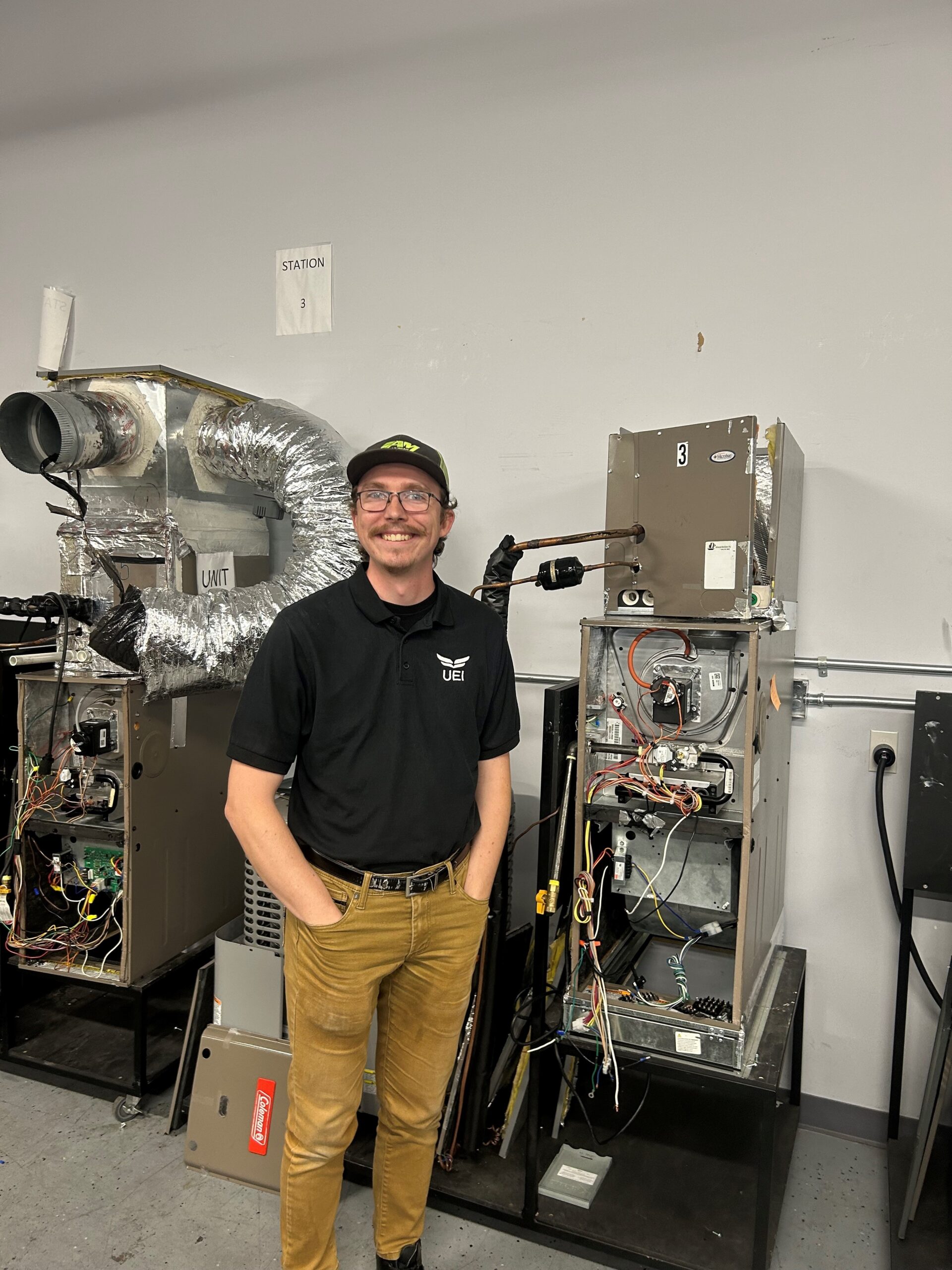HVAC Technician vs. Auto Technician: Which Career Should You Pursue?
REQUEST MORE INFORMATION
Ready to Make a Change? Get Started Today! Book a Campus Tour >
If you are someone who enjoys working with your hands and solving complex puzzles, a career as an HVAC Technician or Automotive Technician may be a good fit for you. These skilled trades can be learned quickly and offer room for growth and stability for years to come. The next question you have to ask yourself is which type of mechanical career would be most enjoyable for you?
Let’s take a closer look at two careers that offer the opportunity to work with your hands and help fix machines that make life more comfortable for people: Auto Technicians and HVAC Technicians. Both are growing fields with chances to learn something new each day and be prepared for an entry-level position in less than one year with training from UEI College.
If you enjoy working with your hands, you should consider enrolling in UEI College's HVAC Program or Automotive Technician Program. Both programs are short-term, allowing you to earn a diploma in as few as 10 Months, allowing you to begin a new and rewarding career in less than a year.
HVAC Technician vs Auto Technician: What Are the Differences?
Before discussing the differences between Automotive Technicians and HVAC Technicians, let’s take a closer look at what each position does.
What is an HVAC Technician?
An HVAC Technician is someone who repairs, maintains, and installs air conditioning, ventilation, and heating equipment that helps keeps homes, businesses, and machinery at a comfortable and safe temperature. They may work indoors or outdoors on residential or even commercial equipment.
Some duties of HVAC Technicians include:
- Replacing worn or broken parts
- Cleaning filters, cleaning air ducts, replacing chemicals, and performing other maintenance tasks
- Installing and testing new parts or equipment
- Diagnosing issues within a system
- Testing air pressure and temperature
- Ensuring proper connection to electricity and plumbing
- Discussing possible solutions with customers and providing estimates for work
- Safely disposing of dangerous chemicals
- Identifying ways to make systems more energy efficient
HVAC Technicians may work odd schedules or be asked to be on-call during peak seasons. Their work may also require them to climb on roofs, into attics, or into cramped spaces.
They work with power tools and are taught a little bit about electrical, plumbing, chemistry, and engineering for their job. This introduction to so many topics makes this job perfect for anyone who gets bored easily and is always excited about a new challenge. There are many different specialties within HVAC to explore. Trained HVAC professionals may specialize in refrigeration, green awareness, solar, air-conditioning repair, installations, ductwork, or commercial units.
What is an Auto Technician?
The terms Automotive Technician and Automotive Mechanic are often used interchangeably. Some in the auto industry may argue that a mechanic is trained only in the mechanics of a vehicle, while an automotive technician is trained to handle mechanical repairs and also uses special tools to diagnose issues with the car’s electrical components. If you are searching for a job in the industry, you may see entry-level positions as either title.
Auto mechanics are responsible for helping repair, replace or maintain vehicles. They may help customers whose vehicles are not working, showing signs of distress or who are simply coming in for an oil change and tire rotation. Whatever the issue, they help people get back on the road quickly. Their daily tasks may include:
- Inspecting a vehicle’s engine, steering, tires, and other systems for any signs of problems
- Using diagnostic equipment to find error codes on the vehicle’s computer system
- Repairing worn or broken parts
- Test driving to ensure a proper fix
- Discuss issues and solutions with customers
- Order parts and equipment
- Change oil, rotate tires, change fluids, and clean or replace filters
Automotive technicians typically work normal business hours, but some shops are open early, late or on the weekends to help meet the demand for service. The job may require crawling under vehicles, lifting heavy equipment, and bending at odd angles to make repairs.
Just like HVAC Technicians, automotive technicians do have the ability to specialize in one area over another. They may specialize in large trucks, engines, transmissions, fabrication, parts, and more.
HVAC Tech vs. Auto Technician: Education and Training
In order to pursue a career as either an HVAC Tech or an Auto Tech, having a high school diploma is the minimum education requirement for most entry-level positions in either field is a high school education. You’ll need to prove you have the ability to perform basic math calculations and write up notes about the work you completed or would recommend.
Not having a high school diploma should not discourage you from pursuing either HVAC or Automotive technician career. You can earn your high school diploma while you complete training at UEI College. Call to learn more about this program.
Most companies like to hire someone who has the training to get started quickly. A good HVAC Training Program will teach you all the basics of these two careers, and you can find training for either career at UEI College. The best part is that it takes as few as ten months to complete either career training program.
After you’ve graduated from the HVAC or Automotive Technician Program, you should feel confident applying for an entry-level position in the field. UEI College can help with building your resume and finding opportunities in your area.
With both of these industries, you will continue to learn and grow every day. There are certifications available in either industry that make it possible to specialize in one area over another or gain new skills that will make you a more valuable employee. New technology will bring new challenges and opportunities to both the HVAC and automotive fields for years to come, which makes both an excellent choice to start today!
HVAC Technician vs. Automotive Technician: Duties & Responsibilities
HVAC Technicians and Automotive Technicians have many similar duties and responsibilities. Both are responsible for repairing, replacing, and maintaining equipment. Their similar duties include:
- Diagnosing issues with the system or equipment
- Repairing or replacing worn or broken parts
- Performing regular maintenance
- Interfacing with customers to discuss the issue and possible solutions within their budget
The difference between these two careers is that HVAC Technicians perform this work on heating, ventilation, and air-conditioning equipment that is located within a business or home. In contrast, an automotive technician performs this work on vehicles in a shop environment.
HVAC Tech vs. Automotive Tech: Work Environment
While both HVAC and Automotive Technicians work with their hands, the work environment is very different. Both of these careers require being comfortable with getting your hands dirty, working independently, working with power tools, lifting heavy equipment, and sometimes crawling into tight spaces, but the similarities end there.
HVAC work is done mostly outdoors, on rooftops, or in unfinished buildings. HVAC technicians are often asked to climb up high to reach the system they are working on, whether that’s on the roof of a building or inside an attic. They need to be comfortable using a ladder and being up high. Repairing refrigeration equipment is usually done indoors, but that involves dangerous chemicals that must be disposed of carefully.
HVAC technicians who do repairs may often work on call and have the opportunity to work overtime during peak seasons of extreme hot or cold. Properly functioning equipment could make a huge difference to a grocery store, restaurant, or even a homeowner facing extreme temperatures in their home.
Automotive technicians work mostly indoors in a well-lit shop. They use special equipment to lift cars so they can reach parts underneath, and they may need to crawl under the vehicle or bend in strange ways to see it properly. Automotive technicians may have the opportunity to work outdoors if they choose.
Auto Technicians may work long hours, but it’s usually within normal business hours, with occasional weekend jobs depending on the shop.
HVAC Technician vs. Auto Technician: Job Safety
Both of these jobs require a lot of training on safety, and companies will follow strict safety guidelines to keep their employees safe. Both careers carry the danger of possible electrocution, burns, or poisoning if safety protocols are not followed.
HVAC Technicians climb up ladders constantly, sometimes while carrying heavy equipment or using power tools. They also deal with dangerous chemicals. The chemicals are so dangerous that the EPA requires special certification for anyone who wishes to purchase or work with refrigerants.
Crawling under heavy machinery and using power tools are the main concerns for auto mechanics.
Which Career Path Should You Pursue?
Which career path you should choose is ultimately up to you. Both give the opportunity to work with your hands, solve problems and help people and you can train for an entry-level position in either field in as few as ten months. If you have always had a natural interest in cars, becoming an automotive technician may make the most sense for you, while a career in HVAC may be a better fit for someone who loves working with HVAC equipment and solving complex problems associated with HVAC systems.
Taking a tour of a school that offers both programs may be a good way to decide. You can tour the labs, meet students and instructors and see which program grabs your attention. Don’t be swayed by other people’s opinions—go out and see for yourself!
How Long Does it Take To Become an Auto Tech vs HVAC Technician?
There are many training programs offered for those interested in careers as either HVAC Technicians or Automotive Technicians. Also, the length of time it takes to complete either program may vary from 10 to 24 months. You can receive all the training necessary for an entry-level position as an automotive technician or an HVAC technician in as few as ten months through UEI College. Our hands-on programs will allow you to test out the concepts you learn before you enter the job field so you may receive certifications that will boost your resume and give you the best chance at success.
Enroll in UEI College's HVAC Tech or Auto Tech Program
With a flexible class schedule and ongoing enrollment, there’s no reason to wait to start a new career with help from UEI College. If you don’t mind getting some dirt on your hands and working hard, we can help you decide which program might be most enjoyable for you. Come in for a tour today and get started on a career you can be proud of! Check out our HVAC Program and Automotive Technician Program.





